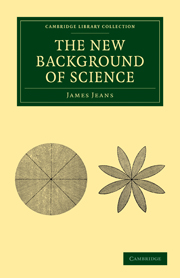Book contents
- Frontmatter
- Contents
- Preface to the First Edition
- Preface to the Second Edition
- Chapter I The Approach to the External World
- Chapter II The Methods of Science
- Chapter III The Framework of the External World—Space and Time
- Chapter IV Mechanism
- Chapter V The Texture of the External World—Matter and Radiation
- Chapter VI Wave-Mechanics
- Chapter VII Indeterminacy
- Chapter VIII Events
- Index
Chapter VII - Indeterminacy
Published online by Cambridge University Press: 07 September 2010
- Frontmatter
- Contents
- Preface to the First Edition
- Preface to the Second Edition
- Chapter I The Approach to the External World
- Chapter II The Methods of Science
- Chapter III The Framework of the External World—Space and Time
- Chapter IV Mechanism
- Chapter V The Texture of the External World—Matter and Radiation
- Chapter VI Wave-Mechanics
- Chapter VII Indeterminacy
- Chapter VIII Events
- Index
Summary
We have seen that our whole knowledge of the external world of physics may be pictured as arising from the impact of photons of energy either on our sense organs or on our physical instruments. As these photons occur in such profusion and variety, it might have been hoped that they would give us an almost perfect knowledge of the outer world.
Yet, as a means of acquiring knowledge, photons suffer from one very serious limitation. They are indivisible; no experiment has ever revealed a fraction of a photon or given any reason for supposing that energy can be either emitted or absorbed in fractions of photons. Thus the only means which are at our disposal for the study of physical nature suffer from a certain coarse-grainedness.
This is of little consequence as regards direct study by our senses, since these are even more coarse-grained. Each sense has its perceptions limited by a certain “threshold of sensation”, and if the stimulus of a physical effect falls below this, the sense in question registers nothing at all. We cannot experience the sweetness of a single molecule of sugar, nor the smell of a single molecule of musk; neither can we hear a bell at more than a certain limit of distance, nor see a star which is below a certain limit of faintness. In general we cannot experience a single photon; thousands at least are necessary to attain the threshold of sensation.
- Type
- Chapter
- Information
- The New Background of Science , pp. 235 - 265Publisher: Cambridge University PressPrint publication year: 2009First published in: 1931



